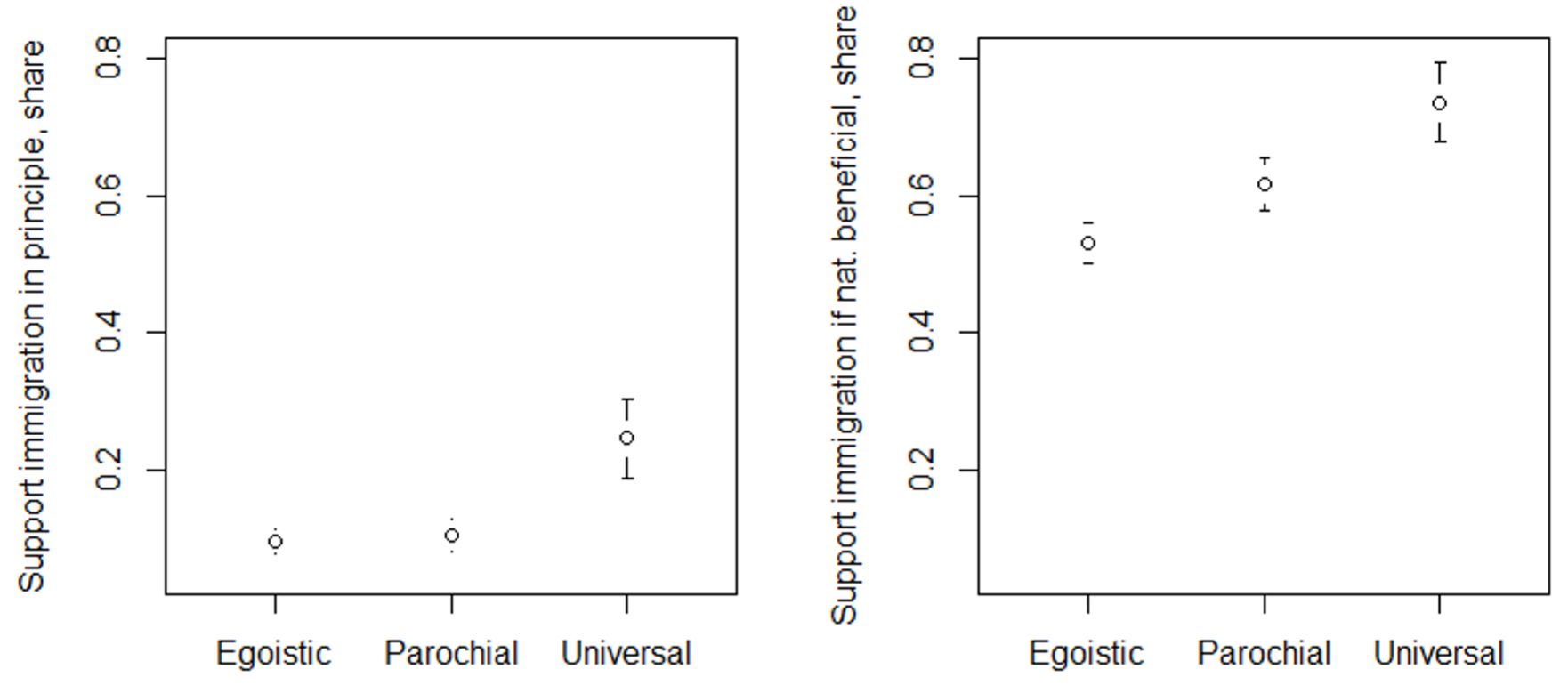 Why are many – even unprejudiced – people sceptical about immigration? Alexander Kustov (Princeton University) shows this scepticism is largely because they think freer immigration will damage their own country. Despite their ethnic biases and other concerns, most voters can support increased immigration if they see that these policies benefit their compatriots in a clear and straightforward way.
Why are many – even unprejudiced – people sceptical about immigration? Alexander Kustov (Princeton University) shows this scepticism is largely because they think freer immigration will damage their own country. Despite their ethnic biases and other concerns, most voters can support increased immigration if they see that these policies benefit their compatriots in a clear and straightforward way.
Why do unprejudiced voters oppose immigration, and when would they support it?
While there have always been diverging opinions over who gets to live and thrive in Britain, immigration has become especially salient in the last decade. Public scepticism of large-scale immigration from both EU and non-EU countries has been further linked to the relative success of the Leave vote in the Brexit referendum. Regardless of the eventual Brexit outcome, Britain will have to decide how to adjust its immigration policy to new economic realities. Nonetheless, it is hard to know which policies are more politically feasible without conclusive evidence on the underlying voter preferences.

The general intention of immigration restrictions is to protect and preserve the wellbeing of a nation’s citizens and institutions. Unfortunately, however, not only do these restrictions often come at a price to the national economy, but they also directly impose substantial costs on global productivity and harm potential migrants. Of course, British voters may disagree over how their government should weigh the costs of such policies on non-voters, but given the enormous opportunities at stake, there can be a number of less restrictive policies that benefit both migrants and citizens.
While public opposition to immigration is well-documented, the sheer extent to which most voters in Britain (and in other countries) dislike any immigration increase is often overlooked. In fact, according to my representative survey, only 20% of educated and progressive British voters (supposedly the most pro-immigration group) would like to see immigration increased (see Figure 1). Nonetheless, it is still unclear whether people dislike the idea of more immigration per se or if this opposition is because of the perceived negative impacts of such policies.
Figure 1: Immigration attitudes across various groups in the UK
The widespread opposition to increasing immigration among even educated and racially egalitarian voters is hard to explain using existing theories that attribute these sentiments to ignorance and prejudice. The extent to which people dislike immigration is especially puzzling given that political preferences are often motivated by genuine altruistic concerns rather than just self-interest. To understand why migration is so unpopular, I argue that it is important to move beyond the stereotypes of “prejudiced” or “self-interested” voters and consider the unlikely role of altruism (motivation to help others at a personal cost) as a driver of anti-immigration attitudes.
Conventional wisdom would suggest that altruism, if it exists at all, should drive people to resist harsh restrictions that harm the opportunities of potential migrants, many of whom are the most impoverished people in the world. Nonetheless, in a world of democratic nation-states, altruists may also feel especially compassionate toward fellow citizens and may resist immigration due to the potential harm they believe it can do to their country. My research tests this hypothesis and reveals that many voters are in fact (national) parochial altruists: they are often willing to incur a personal cost to benefit others, but they prioritise helping their fellow citizens. As a result, independent of their other concerns, voters tend to favour harsh restrictions on immigration when they perceive such restrictions as necessary to secure the well-being of their compatriots.
To reach these conclusions, I first had to develop a robust measure of altruistic preferences. Of course, merely relying on voters’ self-reported desires to help others may not be convincing due to social desirability bias. To deal with this, my survey introduces a variant of a “dictator game” in which respondents participated in a real lottery for a £100 prize and were asked to decide if they would like to keep the prize for themselves or donate part or all of it to a charity of their choice. The suggested charities included three national-oriented charities, three comparable global-oriented charities, and an open-ended response option. Overall, while I find that 57% of respondents (“egoists”) decided to keep all the money, 30% (“parochial altruists”) made a substantial contribution to national-oriented charities and 13% (“universal altruists”) to global-oriented charities. Approximately the same amount of donations was present across groups based on age, gender, income, education, ideology, religiosity, and racial bias.
Overall, my analysis strikingly shows that parochial altruists are as much opposed to immigration as egoists (and much more opposed than universal altruists). In other words, contrary to conventional wisdom, genuine altruism does not translate into pro-immigration attitudes for most people. Using experimental evidence where I manipulate the perceived economic effects of alternative immigration scenarios, I further confirm that most voters support policies based on their national impact (independent of how these policies affect them personally). Nonetheless, voters are evidently divided regarding the proper role of national versus global concerns in political decision-making.
The 2016 Brexit referendum provides a good illustration of how this dynamic plays out in electoral politics. As might be expected, my results show that universal altruists are significantly more likely to have voted Remain compared to other groups. Furthermore, my subsequent experimental research indicates that those who voted Remain are much more sensitive to the global consequences of immigration than those who voted Leave. Nonetheless, it is also true that Remain voters are more responsive to economic impacts in general, including those related to national and personal wealth. Leave voters, in contrast, are much more averse to immigration per se and willing to incur a greater cost to stop its increase. In sum, while this confirms previous studies emphasising the significance of ethnic concerns, my evidence still suggests both selfish and altruistic economic incentives play a major role in Brexit voting and immigration preferences.
Since immigration can be as much an opportunity as a threat, however, it is possible that widespread parochial altruism can actually increase support for immigration under alternative policy conditions. While only a small percentage (12%) of respondents are willing to relax existing restrictions in principle, most (58%) say that they are willing to do it at least for those immigrants who would contribute to the national economy. In line with these results, I also find that 58% of voters would support a new policy significantly increasing immigration if it is explicitly designed to benefit average British citizens through greater selection and taxation of immigrants. Importantly, these nationally beneficial policies also yield a relatively greater support from both universal and parochial altruists (see Figure 2).
Figure 2: Immigration Support by National Impact and Parochial Altruism
But why would voters ever believe that increasing immigration is in their national interest? After all, various attempts to challenge people’s anti-immigration attitudes by providing facts have generally not been successful. The overlooked alternative, however, is to change the policy environment itself. My results demonstrate that voters are willing to compromise their anti-immigration sentiments and support alternative pro-immigration policies when they are confident in their favorable national economic consequences. At the same time, this suggests that simply reducing immigration without addressing their underlying parochial and altruistic concerns may not necessarily appease most who currently oppose immigration or voted Leave.
Both Brexit and immigration debates have often been described as exemplifying the political divide between “nationalists” and “cosmopolitans.” As my account makes clear, however, altruism is exactly what gives motivational power to these conflicting identities. Since most people today say they love their country and care about the world, it may be more instructive to ask whether (and to what extent) voters are actually willing to sacrifice their own well-being for the sake of national or human interest. Consequently, the respective individual differences in (parochial) altruism can provide the psychological basis for an increasingly important political cleavage on globalisation in the UK and other democracies.
This post represents the views of the author and not those of the Brexit blog, nor the LSE.
Alexander Kustov is a doctoral candidate in Princeton University’s Department of Politics and the joint degree program in Social Policy at the Woodrow Wilson School of Public and International Affairs. His research focuses on voter responses to diversity and migration in high-income democracies.









Please don’t assume that “brexiteers” are anti-immigration. If anything we favour immigration from Commonwealth countries over European countries since nearly all of them already speak English as a first language. What we are against is uncontrolled immigration that overwhelms schools and other resources. (Normally LEAs can plan school places against the birth rate fairly accurately. Not any more). We’re also against immigrants masquerading as refugees (I think historically the UK has taken in few genuine refugees – if they stay then they are merely immigrants – a whole other problem to deal with).
Why is there a seemingly universal assumption that we all have an unqualified right to determine by a vote whether to withhold humane living conditions or the means of survival from strangers just because of some historical accident of geography? I have never seen any satisfactory explanation of why there should be a point 12 nautical miles off our coast where all our moral responsibility ceases to exist. Much of the time, we are not responsible for things that go wrong in other parts of the world (although we have contributed more than most to political instability and climate change), but that does not mean that we have no moral responsibility for the victims. We should at least take a fair share of responsibility.
It is almost impossible to pin down any objectively based criteria for “too much immigration” whereas subjective perceptions, both individual and collective, are so elastic and open to political exploitation and manipulation that they are almost meaningless. Like the pea under the princesses mattress in the children’s book, once she is aware of it, it does not matter how many mattresses she has on her bed she will still feel it.
As far as I can see there is very little evidence of any overall systematic correlation between impact or
numbers and peoples attitudes to immigration rather than the level of politicisation. Historically immigration has always been absorbed and becomes less visible over time and is comfortably accepted by society unless it is politicised.
Human populations have always moved and have always had to move for a variety of reasons. As far as I know all the worlds major religions and all the great humanist thinkers have always strongly supported opening our doors and giving charity to those in need both in our own community and those forced to move.
It is an abuse of the term democracy to associate it with the sort of mob majoritarianism that our democratic system has turned into. Democracy first has to fully and genuinely respect the individual rights of all (otherwise the reputation of democracy would be sullied by a number of atrocities carried out by those who could claim some sort of a Democratic mandate partly or fully within the rules that applied at that time and place). Democracy must respect individual freedom to the maximum degree and ONLY when those other two principles have been fully respected should it seek a democratic mandate for collective decisions a community makes on matters of collective interest taking into account the impact on others.
It is not just a matter of what the majority thinks, it is a matter of our moral values and the quality of our democratic and government institutions. But no one seems to believe in those things any more.
Hello, wow, Andrew, are you for real? Don’t you know that the West contributes enormous amounts of money and other means of aid to help the poor people in developing socalled countries? Unfortunately, many of these countries are not developing, unless the word means something like deteriorating. In the West, even in the birth place of European democracy, the Anglo-Saxon lands, democracy is still in development. Sofar, ithas taken about two thousand years in Western Europe. It could take another one thousand to round it off.
Some people would think what you are saying is virtue signalling, but you have nothing to signal with as you have not told us what you have done yourself in the manner of welcoming people to look after them. In a democracy, people have the freedom of choice in principle to do their own bit of charitable giving and helping. To exhort the government to welcome all illegal migrants who wish to come, as Bunds Kanzellerin Frau Merkel did for the whole of the EU, in the face of resistance from the majority as per the UK electorate, is really a very cheap shot. You have a solution which a majority does not want, you expect someone else to pay for it and you have not told us all the good things you yourself have done in that regard.
Anyone with common sense who were to take any notice of what you are on about would wonder if you have any much experience of life in the real world. My home, for instance, has only one space, other than the bathroom, and can only fit a single bed, but if I had a home ten times larger, paid for by my own effort and lifetime hardscrabble saving, I would not share it with any illegal economic migrant, because there are too many in the world for me to make a difference in that way. I sooner spend some of my time freely educating others, who obviously need it, about the facts of life which I have gathered sofar. Savvy?
Andrew D: no one is stopping you from giving to charity, what people do not want is you imposing on them. I agree with your critique of “mob majoritarianism” and the solution should be “volunteerism” and I am sure many would be willing to pay for your one way plane ticket so you can live in the third world and practice your morality.
Right v Left on this subject doesn’t reveal very much.
Try instead to compare people who identify with being of somewhere versus those of us who are happy to live anywhere.
The “somewheres” suffer from the sudden loss (yes, the pace of change is very important) of a community that shares the same language. Compare this loss with those of us who gain from yet another culture in our midst.
I find your argument plausible, but possibly based on a false assumption. If I had to fit into one of your three categories, I would probably be “universal”, but I would not say I am “in favour of more immigration”. Rather, I am opposed to unnecessary controls on immigration. If you ask me “would you be in favour of relaxing or tightening controls on immigration” I would choose the former.
On a second point, one of the confusing factors in the Brexit debate is what we mean by “immigration”. If you see yourself as a European citizen, movement within the EU is simply movement, not immigration. Movement into the EU from outside is immigration. IF, on the other hand, you see yourself as a British citizen first and foremost, the a French person is as much an “immigrant” as a Pakistani.